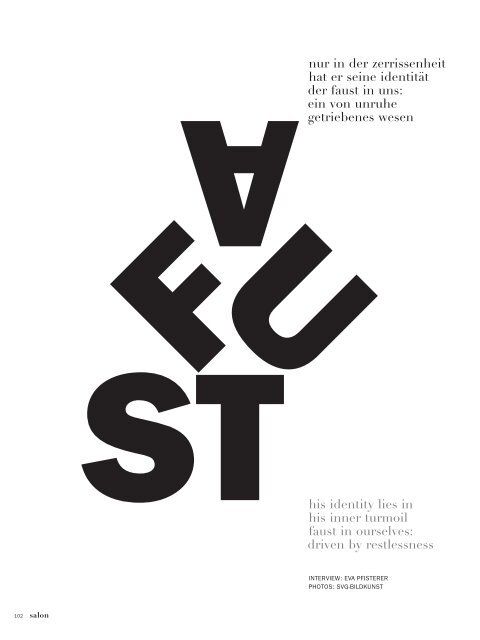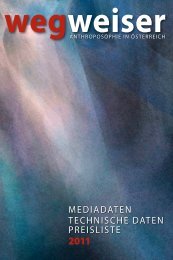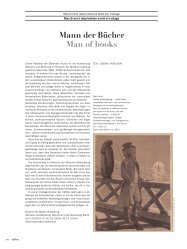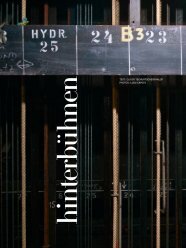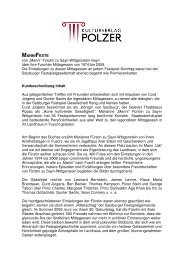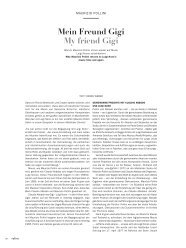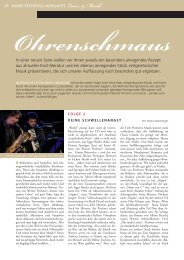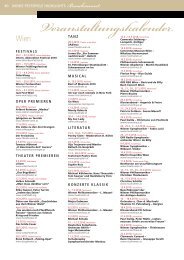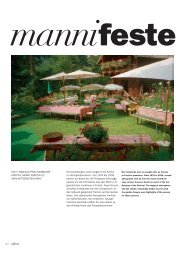nur in der zerrissenheit hat er seine identität der faust in uns: ein von ...
nur in der zerrissenheit hat er seine identität der faust in uns: ein von ...
nur in der zerrissenheit hat er seine identität der faust in uns: ein von ...
Sie wollen auch ein ePaper? Erhöhen Sie die Reichweite Ihrer Titel.
YUMPU macht aus Druck-PDFs automatisch weboptimierte ePaper, die Google liebt.
<strong>nur</strong> <strong>in</strong> <strong>d<strong>er</strong></strong> <strong>z<strong>er</strong>rissenheit</strong><br />
<strong>hat</strong> <strong>er</strong> se<strong>in</strong>e <strong>identität</strong><br />
<strong>d<strong>er</strong></strong> <strong>faust</strong> <strong>in</strong> <strong>uns</strong>:<br />
e<strong>in</strong> <strong>von</strong> unruhe<br />
getriebenes wesen<br />
his identity lies <strong>in</strong><br />
his <strong>in</strong>n<strong>er</strong> turmoil<br />
<strong>faust</strong> <strong>in</strong> ourselves:<br />
driven by restlessness<br />
<strong>in</strong>t<strong>er</strong>view: eva Pfist<strong>er</strong><strong>er</strong><br />
PHOtos: svG-Bildk<strong>uns</strong>t<br />
102<br />
salon
© SVG-Bildk<strong>uns</strong>t, Bonn 2010 für Stephan Balkenhol<br />
salon 103
Eva Pfist<strong>er</strong><strong>er</strong> im Gespräch mit Rüdig<strong>er</strong> Safranski.<br />
eva pfist<strong>er</strong><strong>er</strong>: Faust sche<strong>in</strong>t bis heute sehr aktuell zu se<strong>in</strong>.<br />
Er <strong>er</strong>füllt sich mit Hilfe des Teufels all se<strong>in</strong>e Wünsche, v<strong>er</strong>führt<br />
ohne moralische Bedenken das <strong>uns</strong>chuldige Gretchen,<br />
tötet ihren Bru<strong>d<strong>er</strong></strong>, v<strong>er</strong>giftet ihre Mutt<strong>er</strong>.<br />
Erfolg <strong>hat</strong> <strong>d<strong>er</strong></strong>, <strong>d<strong>er</strong></strong> <strong>nur</strong> an sich denkt. Ist das nicht genau<br />
die gegenwärtige Philosophie nach dem Motto: „D<strong>er</strong> Markt<br />
<strong>hat</strong> imm<strong>er</strong> Recht, und ihm ist alles unt<strong>er</strong>zuordnen?“ Die<br />
V<strong>er</strong>ursach<strong>er</strong> <strong>d<strong>er</strong></strong> F<strong>in</strong>anzkrise w<strong>er</strong>den ebenso wenig zur Kasse<br />
gebeten wie Faust, dessen Seele am Ende vor dem Teufel<br />
g<strong>er</strong>ettet wird.<br />
Rüdig<strong>er</strong> safranski: Das ist wirklich das <strong>er</strong>staunliche an<br />
Goethes Faust. In ihm kann jede Zeit ihre Probleme spiegeln<br />
und ihre Antriebskräfte <strong>er</strong>kennen: <strong>von</strong> <strong>d<strong>er</strong></strong> Sexbesessenheit<br />
bis zur naturausbeutung, zur <strong>er</strong>f<strong>in</strong>dung des Papi<strong>er</strong>geldes<br />
und zum W<strong>uns</strong>ch nach bed<strong>in</strong>gungslos<strong>er</strong> Kapitalv<strong>er</strong>mehrung.<br />
Faust ist tatsächlich e<strong>in</strong> akteur des <strong>er</strong>otisch-wissenschaftlichtechnischen<br />
komplexes. natürlich ist <strong>er</strong> noch viel mehr.<br />
Er will wissen, was die Welt zu<strong>in</strong>n<strong>er</strong>st zusammenhält, und <strong>er</strong><br />
will sich <strong>in</strong> e<strong>in</strong>em großen k<strong>in</strong>o amüsi<strong>er</strong>en – das zeigt die<br />
Beschwörung <strong>d<strong>er</strong></strong> Helena im b<strong>er</strong>ühmten Helena-Akt, Goethes<br />
Exp<strong>er</strong>iment mit den lichtbil<strong>d<strong>er</strong></strong>n. Bei alledem gel<strong>in</strong>gt ihm auch<br />
noch die Himmelfahrt. Das Ganze geht gut aus. Goethe war<br />
eben ganz e<strong>in</strong>fach realistisch genug, um nicht auf das<br />
Weltg<strong>er</strong>icht zu hoffen.<br />
ep: Da ist Thomas Mann im Dr. Faustus konsequent<strong>er</strong>. Bei<br />
ihm holt <strong>d<strong>er</strong></strong> Teufel tatsächlich Fausts Seele ...<br />
RS: Ja, Thomas Mann g<strong>in</strong>g bedeutend moralistisch<strong>er</strong> an se<strong>in</strong><br />
Thema h<strong>er</strong>an. Se<strong>in</strong> wun<strong>d<strong>er</strong></strong>voll<strong>er</strong> Roman ist eben doch e<strong>in</strong>e<br />
z<strong>er</strong>knirschte selbstkasteiung <strong>d<strong>er</strong></strong> deutschen kultur. ästhetisch<br />
grandios, politisch töricht.<br />
ep: Wenn Sie das gegenwärtige „land grabb<strong>in</strong>g“, also den<br />
großflächigen Landkauf <strong>in</strong> Asien und Afrika, ansehen, wo die<br />
Bau<strong>er</strong>n oft mit Waffengewalt <strong>von</strong> ihrem eigenen Grund und<br />
Boden v<strong>er</strong>trieben w<strong>er</strong>den, so kommt e<strong>in</strong>em das v<strong>er</strong>traut vor:<br />
Faust zündet im 5. Akt die Hütte <strong>von</strong> Philemon und Baucis an,<br />
weil sie bei <strong>d<strong>er</strong></strong> Flurb<strong>er</strong>e<strong>in</strong>igung im Wege steht. Dass sie dabei<br />
mitv<strong>er</strong>brannt w<strong>er</strong>den, ist <strong>nur</strong> e<strong>in</strong> Kollat<strong>er</strong>alschaden ...<br />
RS: Ja, Philemon und Baucis w<strong>er</strong>den „plattgemacht“. Faust<br />
will Land aus dem Me<strong>er</strong> gew<strong>in</strong>nen. Goethe war damals fasz<strong>in</strong>i<strong>er</strong>t<br />
<strong>von</strong> den e<strong>in</strong>schlägigen Projekten <strong>d<strong>er</strong></strong> Hollän<strong>d<strong>er</strong></strong> <strong>in</strong> <strong>d<strong>er</strong></strong>en<br />
Land. Diejenigen Hollän<strong>d<strong>er</strong></strong>, die jetzt auf festem Grund leben<br />
und arbeiten, w<strong>er</strong>den v<strong>er</strong>mutlich an<strong>d<strong>er</strong></strong>s üb<strong>er</strong> die Kosten denken,<br />
Philemon und Baucis mit e<strong>in</strong>g<strong>er</strong>echnet. wir alle s<strong>in</strong>d<br />
Profiteure <strong>von</strong> V<strong>er</strong>brechen, die e<strong>in</strong>st begangen wurden.<br />
„Wir alle s<strong>in</strong>d Profiteure<br />
<strong>von</strong> V<strong>er</strong>brechen,<br />
die e<strong>in</strong>st begangen<br />
wurden.“<br />
‘We all profit from past crimes.’<br />
„Goethe war eben<br />
ganz e<strong>in</strong>fach realistisch<br />
genug, um nicht auf<br />
das Weltg<strong>er</strong>icht zu hoffen.“<br />
‘Goethe was just realistic enough not to hope for Judgment Day.’<br />
ep: D<strong>er</strong> Teufel schließt mit Gott e<strong>in</strong>e Wette ab, ob es ihm<br />
gelänge, Faust <strong>von</strong> se<strong>in</strong>em unaufhörlichen Streben abzubr<strong>in</strong>gen<br />
und ihn mit Trivialem zufriedenzustellen. D<strong>er</strong> Teufel v<strong>er</strong>steht<br />
dieses Streben nicht, sieht <strong>nur</strong> das Triebhafte im<br />
Menschen. Hat <strong>d<strong>er</strong></strong> Teufel nicht auch e<strong>in</strong> wenig Recht, dem<br />
re<strong>in</strong>en geistigen Streben auch das S<strong>in</strong>nliche beizumischen?<br />
In <strong>d<strong>er</strong></strong> Dialektik <strong>d<strong>er</strong></strong> Aufklärung warnen jedenfalls Horkheim<strong>er</strong><br />
und Adorno vor <strong>d<strong>er</strong></strong> re<strong>in</strong>en V<strong>er</strong>nunft, <strong>d<strong>er</strong></strong> die durchrationalisi<strong>er</strong>te<br />
Mordmasch<strong>in</strong><strong>er</strong>ie <strong>d<strong>er</strong></strong> Nazis gefolgt sei.<br />
rs: Mephisto v<strong>er</strong>steht den Faust <strong>nur</strong> allzu gut. <strong>er</strong> m<strong>er</strong>kt schon,<br />
dass bei all<strong>er</strong> himmelsstürm<strong>er</strong>ischen Sehnsucht doch auch<br />
für ihn gilt: „Und imm<strong>er</strong> lockt das weib ...“ D<strong>er</strong> trick <strong>von</strong><br />
Mephisto: Man muss die v<strong>er</strong>tikale <strong>in</strong> e<strong>in</strong>e horizontale Dynamik<br />
umbiegen. Kürz<strong>er</strong> kann man den weltbemächtigenden Furor<br />
<strong>d<strong>er</strong></strong> Säkularisi<strong>er</strong>ung nicht beschreiben.<br />
ep: Faust, <strong>d<strong>er</strong></strong> ruhelose Held. Was treibt ihn an?<br />
rs: neugi<strong>er</strong>de und aneignungslust. ab<strong>er</strong> es kommt, aus<br />
Goethes Sicht, noch etwas Entscheidendes h<strong>in</strong>zu. Faust will<br />
ja dem Mephisto <strong>in</strong> <strong>d<strong>er</strong></strong> b<strong>er</strong>ühmten wette beweisen, dass se<strong>in</strong><br />
V<strong>er</strong>langen größ<strong>er</strong> sei als all die Reichtüm<strong>er</strong> und Genüsse, die<br />
Mephisto ihm bieten könne. Mephisto ist <strong>d<strong>er</strong></strong> realist, <strong>d<strong>er</strong></strong><br />
allen Himmelsstürm<strong>er</strong>n gegenüb<strong>er</strong> <strong>er</strong>klärt: „Runt<strong>er</strong> kommen<br />
sie imm<strong>er</strong>!“ In <strong>d<strong>er</strong></strong> Schule des Mephisto wird auch Faust tatsächlich<br />
e<strong>in</strong> tüchtig<strong>er</strong> realist. Denn entspricht es nicht <strong>d<strong>er</strong></strong><br />
Realität, aus nichts, dem Papi<strong>er</strong>geld also, alles, jedenfalls<br />
vieles zu machen? Mephisto bietet ja sogar an, aus Scheiße<br />
Gold zu machen! Ab<strong>er</strong> trotz allem, Faust ist damit doch nicht<br />
zufrieden, <strong>er</strong> will irgendwie mehr, <strong>er</strong> behält se<strong>in</strong>e metaphysische<br />
<strong>identität</strong> auch als realist. es muss Goethe e<strong>in</strong> diebisches<br />
v<strong>er</strong>gnügen b<strong>er</strong>eitet haben, den Faust am ende<br />
schließlich dem Mephisto entkommen zu lassen. <strong>in</strong> dem<br />
Augenblick als Mephisto glaubt, <strong>er</strong> könne sich Fausts Seele<br />
schnappen, entdeckt dies<strong>er</strong> jedoch die ansehnlichen, knackigen<br />
H<strong>in</strong>t<strong>er</strong>n <strong>d<strong>er</strong></strong> engel; <strong>in</strong> die v<strong>er</strong>guckt <strong>er</strong> sich, und so<br />
schnappen ihm die engel den Faust weg. D<strong>er</strong> realist Mephisto<br />
ist selbst Opf<strong>er</strong> se<strong>in</strong>es schwulen Begehrens geworden! ist<br />
das nicht e<strong>in</strong> wun<strong>d<strong>er</strong></strong>bar<strong>er</strong> Schluss, <strong>d<strong>er</strong></strong> dabei noch so h<strong>er</strong>rlich<br />
katholisch ist!<br />
ep: Sie, H<strong>er</strong>r Safranski, haben wun<strong>d<strong>er</strong></strong>bare, <strong>er</strong>folgreiche<br />
Büch<strong>er</strong> geschrieben und könnten sich längst zur Ruhe setzen<br />
und das Leben genießen. Was treibt Sie an, weit<strong>er</strong> zu<br />
schreiben?<br />
rs: ruhe f<strong>in</strong>de ich beim schreiben. ich meide die unruhe,<br />
die entstünde, wenn ich mich vom schreiben zur ruhe<br />
setzte ...<br />
104<br />
salon
Eva Pfist<strong>er</strong><strong>er</strong> <strong>in</strong> conv<strong>er</strong>sation with<br />
Rüdig<strong>er</strong> Safranski.<br />
EVA PFISTERER: Faust still appears<br />
highly topical to this day. He fulfills all<br />
of his wishes with the help of the devil,<br />
seduces <strong>in</strong>nocent Gretchen without any<br />
moral compunctions, kills h<strong>er</strong> broth<strong>er</strong> and<br />
poisons h<strong>er</strong> moth<strong>er</strong>.<br />
People succeed, when they consi<strong>d<strong>er</strong></strong> no<br />
one but themselves. Doesn’t t<strong>hat</strong> sum<br />
up the current philosophy accord<strong>in</strong>g to<br />
the motto: The market always w<strong>in</strong>s, and<br />
noth<strong>in</strong>g else counts? Those who caused<br />
the f<strong>in</strong>ancial crisis are not be<strong>in</strong>g asked<br />
to pay up any more so than Faust, whose<br />
soul was saved from the devil <strong>in</strong> the end.<br />
rüDIGER SAFRANSKI: T<strong>hat</strong>’s truly the<br />
amaz<strong>in</strong>g th<strong>in</strong>g about Goethe’s Faust.<br />
People of all <strong>er</strong>as can see their problems<br />
reflected <strong>in</strong> it, as well as recogniz<strong>in</strong>g their<br />
driv<strong>in</strong>g forces, from the obsession with<br />
sex to the exploitation of nature and the<br />
<strong>in</strong>vention of pap<strong>er</strong> currency to the dream<br />
of endless riches. Faust is actually a play<strong>er</strong><br />
of the <strong>er</strong>otic-scientific-technical complex.<br />
Of course he’s a lot more than t<strong>hat</strong>.<br />
He wants to know w<strong>hat</strong> keeps the world<br />
sp<strong>in</strong>n<strong>in</strong>g, and he wants to be ent<strong>er</strong>ta<strong>in</strong>ed<br />
by the world stage – as can be seen dur<strong>in</strong>g<br />
the summon<strong>in</strong>g of Helen <strong>in</strong> the famous<br />
Helen Act, Goethe’s exp<strong>er</strong>iment with<br />
light projections. Despite ev<strong>er</strong>yth<strong>in</strong>g, he<br />
still gets to go to heaven. The story has<br />
a happy end. Goethe was just realistic<br />
enough not to hope for Judgment Day.<br />
ep: Thomas Mann is more consequential<br />
<strong>in</strong> Dr Faustus. In his case, the devil really<br />
does w<strong>in</strong> ov<strong>er</strong> Faust’s soul…<br />
rs: Yes, Thomas Mann took a significantly<br />
more moralistic approach to the<br />
theme. His won<strong>d<strong>er</strong></strong>ful novel is a remorseful<br />
self-castigation of G<strong>er</strong>man culture.<br />
Aesthetically grand, yet politically foolish.<br />
ep: If you look at the current practice of<br />
land grabb<strong>in</strong>g, or large-scale confiscation<br />
of land <strong>in</strong> Asia and Africa, wh<strong>er</strong>e farm<strong>er</strong>s<br />
are often forced off their own fields<br />
un<strong>d<strong>er</strong></strong> the threat of violence, it would<br />
seem familiar. In Act V, Faust ignites<br />
Philemon and Baucis’ hut, because it’s<br />
<strong>in</strong> the way of his field consolidation. The<br />
fact t<strong>hat</strong> they burn to death <strong>in</strong> the fire is<br />
noth<strong>in</strong>g but collat<strong>er</strong>al damage…<br />
rs: Yes, he gets Philemon and Baucis<br />
‘out of the way.’ Faust wants to recov<strong>er</strong><br />
land from the sea. At the time, Goethe<br />
was fasc<strong>in</strong>ated by similar projects <strong>in</strong><br />
Holland. Dutchmen, who now live and<br />
work on recov<strong>er</strong>ed land, presumably have<br />
a diff<strong>er</strong>ent view of the costs <strong>in</strong>volved,<br />
<strong>in</strong>clud<strong>in</strong>g Philemon and Baucis. We all<br />
profit from past crimes.<br />
„Ruhe f<strong>in</strong>de ich beim<br />
Schreiben. Ich meide<br />
die Unruhe, die entstünde,<br />
wenn ich mich vom<br />
Schreiben zur Ruhe<br />
setzte ...“<br />
‘I’m avoid<strong>in</strong>g the restlessness t<strong>hat</strong> would set <strong>in</strong>,<br />
if I retired from writ<strong>in</strong>g…’<br />
ep: The devil makes a wag<strong>er</strong> with God<br />
as to wheth<strong>er</strong> he will succeed <strong>in</strong> desist<strong>in</strong>g<br />
Faust from his goals and mak<strong>in</strong>g him<br />
satisfied with someth<strong>in</strong>g more trivial. The<br />
devil doesn’t un<strong>d<strong>er</strong></strong>stand Faust’s aspirations;<br />
he only sees human <strong>in</strong>st<strong>in</strong>cts. Isn’t<br />
the devil partly right, when he consi<strong>d<strong>er</strong></strong>s<br />
carnal desires a facet of our <strong>in</strong>tellectual<br />
aspirations? In the dialectic of enlightenment,<br />
Horkheim<strong>er</strong> and Adorno warn<br />
aga<strong>in</strong>st pure reason, which the rationalized<br />
Nazi kill<strong>in</strong>g mach<strong>in</strong>e was based upon.<br />
rs: Mephistopheles un<strong>d<strong>er</strong></strong>stands Faust<br />
all too well. He does realize t<strong>hat</strong> he’s<br />
still human despite his romantic-idealistic<br />
yearn<strong>in</strong>gs: He’s et<strong>er</strong>nally tempted<br />
by women … Mephistopheles’ trick is<br />
to turn the v<strong>er</strong>tical dynamics <strong>in</strong>to a horizontal<br />
form. Th<strong>er</strong>e is no brief<strong>er</strong> way to<br />
describe the globally empow<strong>er</strong><strong>in</strong>g furor<br />
of secularization.<br />
ep: Faust, the restless h<strong>er</strong>o. W<strong>hat</strong> propels<br />
him?<br />
RS: Curiosity and the desire to appropriate<br />
ev<strong>er</strong>yth<strong>in</strong>g. Yet from Goethe’s po<strong>in</strong>t of<br />
view, th<strong>er</strong>e is anoth<strong>er</strong> decisive question.<br />
Faust wants to prove to Mephistopheles<br />
by means of his famous wag<strong>er</strong> t<strong>hat</strong> his<br />
desire is great<strong>er</strong> than all the riches and<br />
pleasures Mephistopheles has to off<strong>er</strong>.<br />
Mephistopheles is a realist, who says of all<br />
romantic idealists: ‘They’ll always come<br />
back down to earth!’ In Mephistopheles’<br />
school, Faust actually becomes a staunch<br />
realist. Isn’t it realistic to do almost anyth<strong>in</strong>g<br />
with noth<strong>in</strong>g - <strong>in</strong> the form of pap<strong>er</strong><br />
currency? Mephistopheles even off<strong>er</strong>s<br />
to turn shit <strong>in</strong>to gold! Yet despite ev<strong>er</strong>yth<strong>in</strong>g,<br />
Faust isn’t satisfied, he wants<br />
more. He also ma<strong>in</strong>ta<strong>in</strong>s his metaphysical<br />
identity as a realist. It must have<br />
devilishly delighted Goethe to let Faust<br />
escape Mephistopheles <strong>in</strong> the end. The<br />
latt<strong>er</strong> believes t<strong>hat</strong> the moment has<br />
arrived when Faust’s soul will snap, but<br />
then come the angels with their cute<br />
bums. Mephistopheles forgets himself<br />
look<strong>in</strong>g at them, and the angels manage<br />
to snatch Faust away from him. The realist<br />
Mephistopheles has become a victim<br />
of his gay desires! Isn’t t<strong>hat</strong> a fantastic<br />
f<strong>in</strong>ale, and so gloriously Catholic at the<br />
same time!<br />
ep: Mr Safranski, you have written highly<br />
successful books, and would have been<br />
able to retire long ago to enjoy your life.<br />
W<strong>hat</strong> makes you, and oth<strong>er</strong>s, cont<strong>in</strong>ue<br />
to write?<br />
RS: I f<strong>in</strong>d peace <strong>in</strong> writ<strong>in</strong>g. I’m avoid<strong>in</strong>g<br />
the restlessness t<strong>hat</strong> would set <strong>in</strong>, if I<br />
retired from writ<strong>in</strong>g…<br />
ep: You once made the won<strong>d<strong>er</strong></strong>ful statement<br />
t<strong>hat</strong> expla<strong>in</strong>s why m<strong>er</strong>chandise,<br />
sex, alcohol and pure pleasure leave<br />
noth<strong>in</strong>g beh<strong>in</strong>d but a stale aft<strong>er</strong>taste:<br />
‘August<strong>in</strong>e loved life above all. He discov<strong>er</strong>ed<br />
God, because God alone was great<br />
enough to embody all his desire.’ W<strong>hat</strong> is<br />
the desire, the restlessness, from which<br />
Faust hoped to free himself? Is it the<br />
thymotic urge t<strong>hat</strong> Plato writes about?<br />
rs: It was v<strong>er</strong>y creditable of my friend<br />
Slot<strong>er</strong>dijk to rem<strong>in</strong>d us of the thymotic<br />
urge <strong>in</strong> his book Zorn und Zeit (lit.<br />
transl: Ang<strong>er</strong> and Time). W<strong>hat</strong> does it<br />
mean? Noth<strong>in</strong>g oth<strong>er</strong> than the desire for<br />
self-respect. A p<strong>er</strong>son, who simply wants<br />
to rema<strong>in</strong> alive at all costs, has no self<br />
t<strong>hat</strong>’s worthy of respect – noth<strong>in</strong>g but<br />
biology is left. And dignity isn’t a biological<br />
function. Humanity isn’t a zoological<br />
t<strong>er</strong>m eith<strong>er</strong>, it means, as they used to say:<br />
‘I must honor and respect the humanity<br />
myself and oth<strong>er</strong>s.’ Human life is more<br />
than the <strong>in</strong>carnation of a biological program.<br />
We can reflect or speculate without<br />
end upon w<strong>hat</strong> else it consists of,<br />
view<strong>in</strong>g it as the bequest of a religion,<br />
<strong>in</strong> which God speaks familiarly to humank<strong>in</strong>d.<br />
T<strong>hat</strong>’s heavy duty. Paradise may<br />
have been a human zoo, but if God’s on<br />
familiar t<strong>er</strong>ms with mank<strong>in</strong>d, t<strong>hat</strong> makes<br />
people more than just creatures. Their<br />
nakedness was no long<strong>er</strong> appropriate. Our<br />
thymotic urge leads us to see t<strong>hat</strong> we<br />
are more than just biology. Faust follows<br />
the thymotic urge, <strong>in</strong> good and bad alike.<br />
salon 105
ep: Sie haben e<strong>in</strong>mal diesen wun<strong>d<strong>er</strong></strong>baren Satz gesagt, <strong>d<strong>er</strong></strong><br />
so schön e<strong>in</strong>sichtig macht, warum <strong>uns</strong> <strong>d<strong>er</strong></strong> Konsum <strong>von</strong><br />
Waren, Sex, Alkohol, also <strong>von</strong> re<strong>in</strong>em Genuss, nicht genügt,<br />
<strong>uns</strong> <strong>nur</strong> e<strong>in</strong>en schalen Geschmack h<strong>in</strong>t<strong>er</strong>lassen kann:<br />
„August<strong>in</strong> liebte das Leben maßlos. Deshalb wurde es ihm<br />
zu eng. Er entdeckte Gott, weil <strong>nur</strong> Gott g<strong>er</strong>äumig genug ist,<br />
se<strong>in</strong>e unendliche Sehnsucht aufzunehmen.“ Was ist diese<br />
Sehnsucht, diese Unruhe, <strong>von</strong> <strong>d<strong>er</strong></strong> Faust befreit w<strong>er</strong>den wollte?<br />
Ist es das thymotische Pr<strong>in</strong>zip, <strong>von</strong> dem Platon schreibt?<br />
RS: Es war sehr v<strong>er</strong>dienstvoll, dass me<strong>in</strong> Freund Slot<strong>er</strong>dijk <strong>in</strong><br />
se<strong>in</strong>em Buch Zorn und Zeit an dieses thymotische Pr<strong>in</strong>zip <strong>er</strong><strong>in</strong>n<strong>er</strong>t<br />
<strong>hat</strong>. was bedeutet es? nichts an<strong>d<strong>er</strong></strong>es als das v<strong>er</strong>langen<br />
nach Selbstachtung. E<strong>in</strong> Selbst, das um jeden Preis e<strong>in</strong>fach<br />
<strong>nur</strong> am Leben bleiben will, ist ke<strong>in</strong> Selbst, das man zu achten<br />
braucht – das ist bloß Biologie. Würde h<strong>in</strong>gegen ist ke<strong>in</strong>e<br />
biologische Funktion, Menschheit ke<strong>in</strong> zoologisch<strong>er</strong> Begriff.<br />
Früh<strong>er</strong> sagte man: „Ich muss die Menschheit <strong>in</strong> mir ehren<br />
und achten können.“ Menschliches leben ist mehr als <strong>nur</strong><br />
die Realisi<strong>er</strong>ung des biologischen Programms. Üb<strong>er</strong> dieses<br />
„Mehr“ können wir unablässig nachdenken, spekuli<strong>er</strong>en, es<br />
als Erbteil e<strong>in</strong><strong>er</strong> Religion ansehen, <strong>in</strong> welch<strong>er</strong> <strong>d<strong>er</strong></strong> Mensch <strong>von</strong><br />
Gott mit „Du“ ang<strong>er</strong>edet wurde. Das ist e<strong>in</strong> starkes stück.<br />
Das Paradies mag e<strong>in</strong> Menschenzoo gewesen se<strong>in</strong>, mit dies<strong>er</strong><br />
Anrede ab<strong>er</strong> waren die Menschen auf e<strong>in</strong>mal etwas an<strong>d<strong>er</strong></strong>es<br />
als <strong>nur</strong> lebewesen. Mit ihr<strong>er</strong> nacktheit war es dann<br />
nicht mehr getan. Das thymotische <strong>in</strong> <strong>uns</strong> stiftet <strong>uns</strong> dazu<br />
an, mehr <strong>in</strong> <strong>uns</strong> zu sehen als bloße Biologie. Faust ist e<strong>in</strong><br />
Thymotik<strong>er</strong>, im Guten wie im Bösen.<br />
ep: Die Engel s<strong>in</strong>gen die Begründung <strong>von</strong> Fausts Errettung:<br />
„W<strong>er</strong> imm<strong>er</strong> strebend sich bemüht, den können wir <strong>er</strong>lösen.“<br />
Z<strong>er</strong>stört nicht g<strong>er</strong>ade dies<strong>er</strong> Geist die Natur? Sollten wir angesichts<br />
<strong>von</strong> Fukushima und <strong>d<strong>er</strong></strong> Ölkatastrophe im Golf <strong>von</strong><br />
Mexiko nicht eh<strong>er</strong> <strong>d<strong>er</strong></strong> <strong>faust</strong>ischen Maßlosigkeit abschwören?<br />
rs: angesichts <strong>d<strong>er</strong></strong> <strong>faust</strong>ischen aufgaben bei <strong>d<strong>er</strong></strong> en<strong>er</strong>giewende<br />
w<strong>er</strong>den wir e<strong>in</strong>e gewisse Maßlosigkeit des selbstzutrauens,<br />
nämlich dass e<strong>in</strong>e solche wende gel<strong>in</strong>gen kann, wohl bitt<strong>er</strong><br />
nötig haben. so große aufgaben kann man <strong>nur</strong> anpacken,<br />
wenn man realist und zugleich e<strong>in</strong> bisschen v<strong>er</strong>rückt ist ...<br />
„Wir s<strong>in</strong>d <strong>in</strong> <strong>d<strong>er</strong></strong> Regel<br />
nicht zu sehr<br />
Individualisten,<br />
wir s<strong>in</strong>d es zu wenig.“<br />
‘As a rule we aren’t <strong>in</strong>dividualistic enough, rath<strong>er</strong> than be<strong>in</strong>g too much so.’<br />
„Menschliches Leben<br />
ist mehr als <strong>nur</strong> die<br />
Realisi<strong>er</strong>ung des<br />
biologischen Programms.“<br />
‘Human life is more than the <strong>in</strong>carnation of a biological program.’<br />
ep: „Sei de<strong>in</strong> eigen<strong>er</strong> Maßstab“ – ruft <strong>d<strong>er</strong></strong> Teufel Faust zu.<br />
D<strong>er</strong> auf sich selbst zurückgeworfene Mensch kann se<strong>in</strong>e<br />
Bedürfnisse nach Liebe, Geborgenheit, S<strong>in</strong>n, Bildung etc. <strong>nur</strong><br />
kurzfristig durch den Gott „Konsum“ betäuben. Sucht, Rastlosigkeit,<br />
Liebesunfähigkeit, Depression – ist das Ausdruck<br />
e<strong>in</strong>es falsch v<strong>er</strong>standenen Individualismus, e<strong>in</strong><strong>er</strong> gescheit<strong>er</strong>ten<br />
S<strong>in</strong>nsuche o<strong>d<strong>er</strong></strong> <strong>von</strong> Langeweile?<br />
RS: E<strong>in</strong> Problem hi<strong>er</strong>zulande ist sich<strong>er</strong>lich, dass viele Leute<br />
<strong>von</strong> sich selbst gelangweilt s<strong>in</strong>d. Man hält es e<strong>in</strong>fach nicht<br />
bei sich aus. Das eigene selbst ist nicht abendfüllend.<br />
Deshalb F<strong>er</strong>nsehen und Int<strong>er</strong>net. Wir s<strong>in</strong>d <strong>in</strong> <strong>d<strong>er</strong></strong> Regel nicht<br />
zu sehr Individualisten, wir s<strong>in</strong>d es zu wenig. E<strong>in</strong> Individuum<br />
s<strong>in</strong>d wir <strong>er</strong>st dann, wenn wir bei <strong>d<strong>er</strong></strong> Selbstbegegnung nicht<br />
fürchten müssen, <strong>in</strong> e<strong>in</strong> schwarzes loch zu fallen. Die<br />
Schwarzen Löch<strong>er</strong> gibt es eben nicht <strong>nur</strong> im Weltraum. Ihre<br />
V<strong>er</strong>meidung ist zum Breitensport geworden. Das ist das<br />
Betriebsgeheimnis <strong>d<strong>er</strong></strong> Unt<strong>er</strong>haltungs<strong>in</strong>dustrie. Unt<strong>er</strong>halten,<br />
d. h. unt<strong>er</strong>-gehalten w<strong>er</strong>den müssen die Absturzgefährdeten.<br />
„W<strong>er</strong>de, <strong>d<strong>er</strong></strong> du bist“ – das könnte eh<strong>er</strong> Panik auslösen.<br />
ep: Am Schluss v<strong>er</strong>schmelzen ja Faust und Mephisto zunehmend<br />
zu e<strong>in</strong><strong>er</strong> P<strong>er</strong>son, w<strong>er</strong>den e<strong>in</strong>an<strong>d<strong>er</strong></strong> imm<strong>er</strong> ähnlich<strong>er</strong>. Sie,<br />
H<strong>er</strong>r Safranski, haben e<strong>in</strong> Buch üb<strong>er</strong> Das Böse geschrieben.<br />
Besteht die Trennung zwischen Gut und Böse <strong>nur</strong> <strong>in</strong> <strong>uns</strong><strong>er</strong>em<br />
Kopf, weil wir das Böse abspalten?<br />
rs: Die wirklichkeit ist e<strong>in</strong>e e<strong>in</strong>zige Gemengelage. <strong>uns</strong><strong>er</strong> kopf<br />
br<strong>in</strong>gt da e<strong>in</strong>ige Ordnung h<strong>in</strong>e<strong>in</strong>, <strong>uns</strong><strong>er</strong>e eigene Ordnung.<br />
Dies<strong>er</strong> ordnende kopf gehört ab<strong>er</strong> auch <strong>in</strong>s Ganze h<strong>in</strong>e<strong>in</strong>. <strong>von</strong><br />
Gut und Böse können wir <strong>uns</strong> dah<strong>er</strong> <strong>nur</strong> v<strong>er</strong>abschieden, wenn<br />
wir <strong>uns</strong> auch <strong>von</strong> <strong>uns</strong><strong>er</strong>em Kopf v<strong>er</strong>abschieden. Ich behaupte<br />
nicht, dass solches nicht imm<strong>er</strong> wie<strong>d<strong>er</strong></strong> v<strong>er</strong>sucht würde.<br />
ep: Ist die Botschaft <strong>von</strong> Faust neben <strong>d<strong>er</strong></strong> S<strong>in</strong>nsuche auch<br />
die Selbst<strong>er</strong>ziehung? „W<strong>er</strong> Gutes will, <strong>d<strong>er</strong></strong> sei <strong>er</strong>st gut. W<strong>er</strong><br />
Freunde will, besänftige se<strong>in</strong> Blut.“ Auch Kästn<strong>er</strong> sagt: „Es<br />
gibt nichts Gutes, auß<strong>er</strong> man tut es.“<br />
RS: Richtig.<br />
106<br />
salon
© SVG-Bildk<strong>uns</strong>t, Bonn 2010 für Stephan Balkenhol<br />
ep: The angels chant the reason for<br />
Faust’s salvation: ‘Who strives always to<br />
the utmost, for him th<strong>er</strong>e is salvation.’<br />
Isn’t it this v<strong>er</strong>y spirit, which is destroy<strong>in</strong>g<br />
nature? Shouldn’t we renounce Faust’s<br />
self-<strong>in</strong>dulgence <strong>in</strong> view of the catastrophes<br />
<strong>in</strong> Fukushima and the Gulf of Mexico?<br />
rs: Consi<strong>d<strong>er</strong></strong><strong>in</strong>g the gigantic task of<br />
switch<strong>in</strong>g ov<strong>er</strong> to green en<strong>er</strong>gy, we’ll<br />
desp<strong>er</strong>ately need a c<strong>er</strong>ta<strong>in</strong> degree of<br />
immo<strong>d<strong>er</strong></strong>ate self-confidence <strong>in</strong> or<strong>d<strong>er</strong></strong> to<br />
trust t<strong>hat</strong> we’ll succeed. Only realists,<br />
who are also a touch crazy, can un<strong>d<strong>er</strong></strong>take<br />
such huge tasks.<br />
ep: The Devil says to Faust: ‘Be your own<br />
judge.’ Whenev<strong>er</strong> man is left to his own<br />
devices, he can only briefly satisfy his<br />
need for love, security, mean<strong>in</strong>g, education<br />
etc via the ‘god of consum<strong>er</strong>ism.’<br />
Addiction, restlessness, an <strong>in</strong>ability to<br />
love and depression – aren’t those the<br />
expression of a false un<strong>d<strong>er</strong></strong>stand<strong>in</strong>g of<br />
<strong>in</strong>dividualism, a failed quest for mean<strong>in</strong>g,<br />
or boredom?<br />
RS: In this country, one of the problems<br />
is t<strong>hat</strong> many people are bored with themselves.<br />
They can’t stand be<strong>in</strong>g alone.<br />
They don’t knwow how to ent<strong>er</strong>ta<strong>in</strong><br />
themselves – and resort to television and<br />
the Int<strong>er</strong>net. As a rule we aren’t <strong>in</strong>dividualistic<br />
enough, rath<strong>er</strong> than be<strong>in</strong>g too<br />
much so. We have not become <strong>in</strong>dividuals<br />
until the po<strong>in</strong>t t<strong>hat</strong> we are no long<strong>er</strong><br />
afraid of fall<strong>in</strong>g <strong>in</strong>to a black hole, when<br />
we are confronted with ourselves. Black<br />
holes aren’t just found <strong>in</strong> out<strong>er</strong> space.<br />
It has become a popular sport to avoid<br />
them. T<strong>hat</strong>’s the secret recipe of the<br />
ent<strong>er</strong>ta<strong>in</strong>ment <strong>in</strong>dustry. Those <strong>in</strong> dang<strong>er</strong><br />
of fall<strong>in</strong>g <strong>in</strong>to the black hole have to be<br />
ent<strong>er</strong>ta<strong>in</strong>ed. To ‘be yourself’ could give<br />
rise to panic.<br />
ep: In the end Faust and Mephistopheles<br />
beg<strong>in</strong> m<strong>er</strong>g<strong>in</strong>g <strong>in</strong>to one p<strong>er</strong>son, becom<strong>in</strong>g<br />
more and more similar to each oth<strong>er</strong>. Mr<br />
Safranski, you’ve written a book entitled<br />
Das Böse (lit. transl: Evil). Does the diff<strong>er</strong>ence<br />
between good and evil only exist<br />
<strong>in</strong> our heads, s<strong>in</strong>ce we dissociate t<strong>hat</strong><br />
which is evil?<br />
rs: Reality is noth<strong>in</strong>g but chaos. Our<br />
rational thought tries to put it <strong>in</strong>to or<strong>d<strong>er</strong></strong>.<br />
But it’s an or<strong>d<strong>er</strong></strong> we’ve created. And it<br />
should also <strong>in</strong>clude our rational thought.<br />
We can only bid farewell to good and evil,<br />
if we bid farewell to rational thought. I’m<br />
not claim<strong>in</strong>g t<strong>hat</strong> attempts aren’t made<br />
to do t<strong>hat</strong> now and then.<br />
ep: Is Faust’s message t<strong>hat</strong> of self-discipl<strong>in</strong>e,<br />
<strong>in</strong> addition to the quest for mean<strong>in</strong>g?<br />
‘Who wishes good, should first be<br />
good. Who wishes joy, should mollify his<br />
blood.’ Kant also stated: ‘Live your life<br />
as though your ev<strong>er</strong>y act w<strong>er</strong>e to become<br />
a univ<strong>er</strong>sal law.’<br />
RS: Right.<br />
Stephan Balkenhol<br />
Ansichten <strong>d<strong>er</strong></strong> Skulptur<br />
sempre più auf dem<br />
Caesarforum, 2009<br />
Ze<strong>d<strong>er</strong></strong>nholz/Cedar wood<br />
570 x 280 x 100 cm<br />
salon 107
© SVG-Bildk<strong>uns</strong>t, Bonn 2010 für Stephan Balkenhol<br />
108<br />
salon


